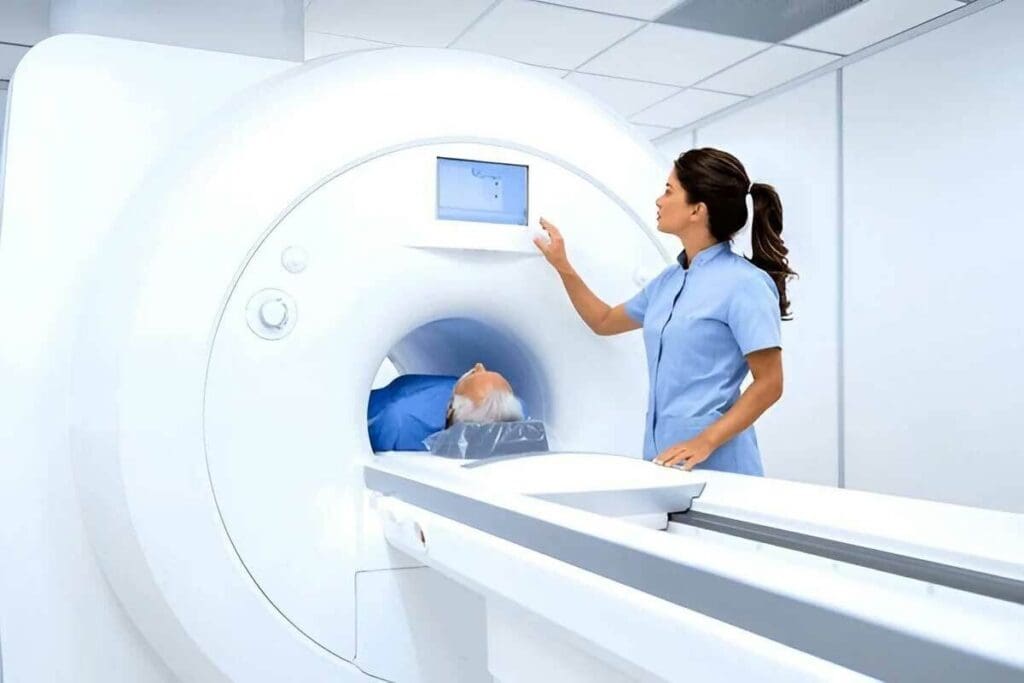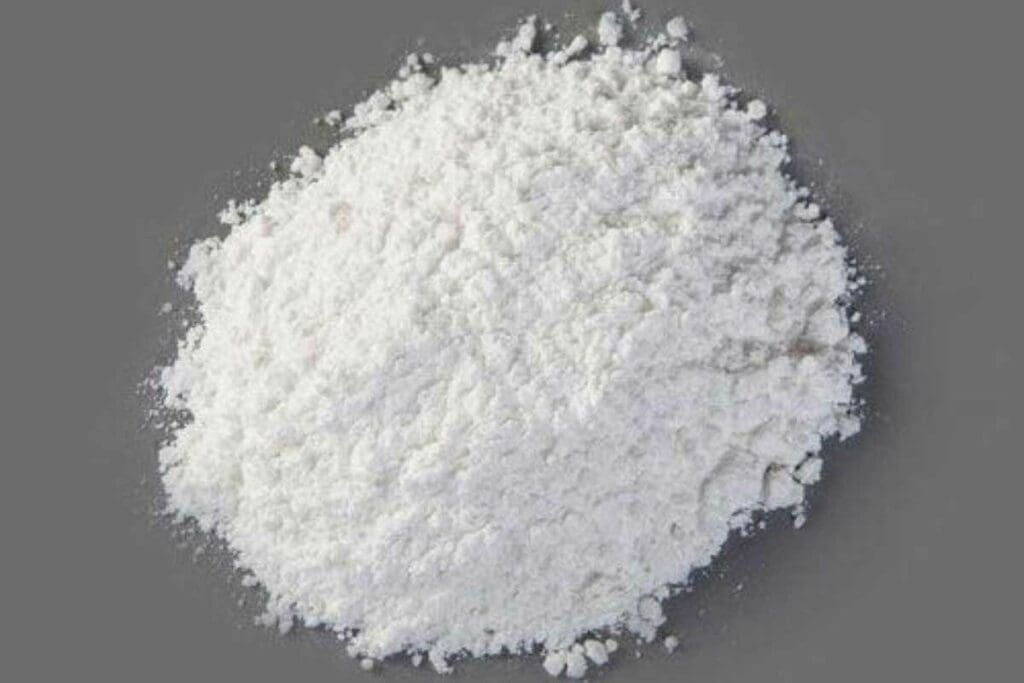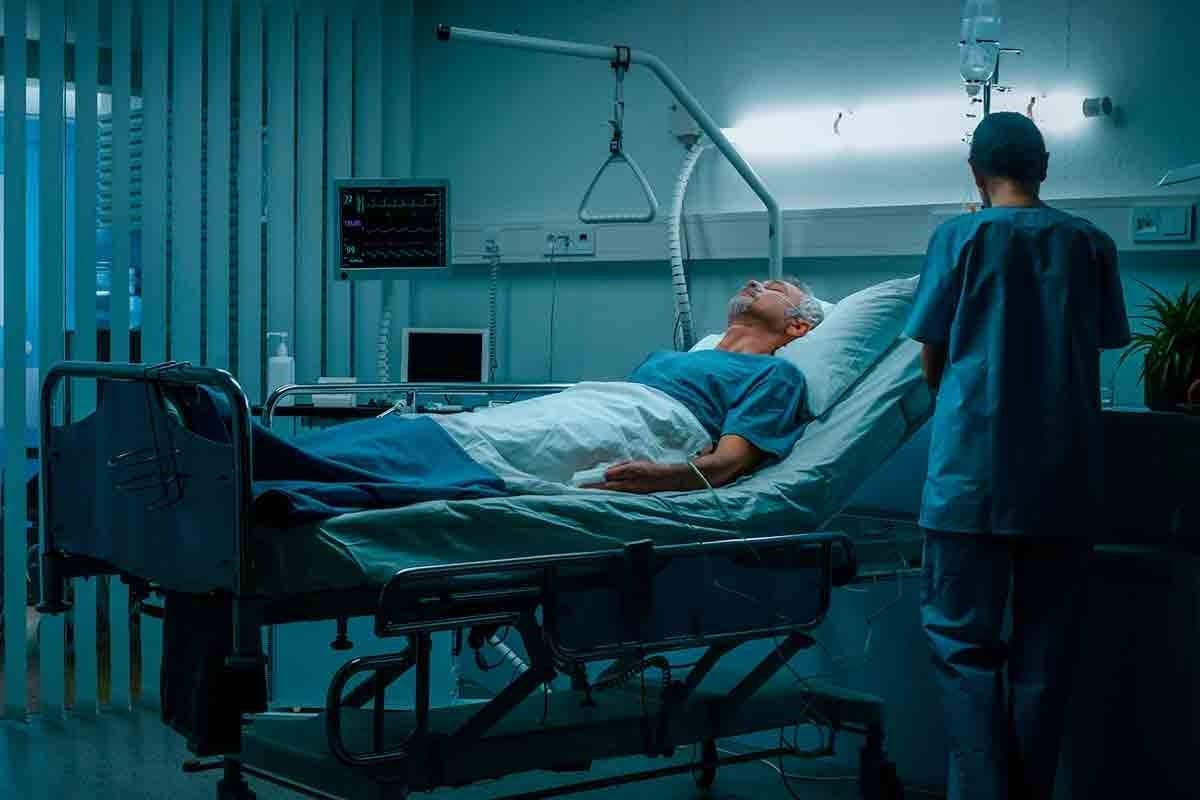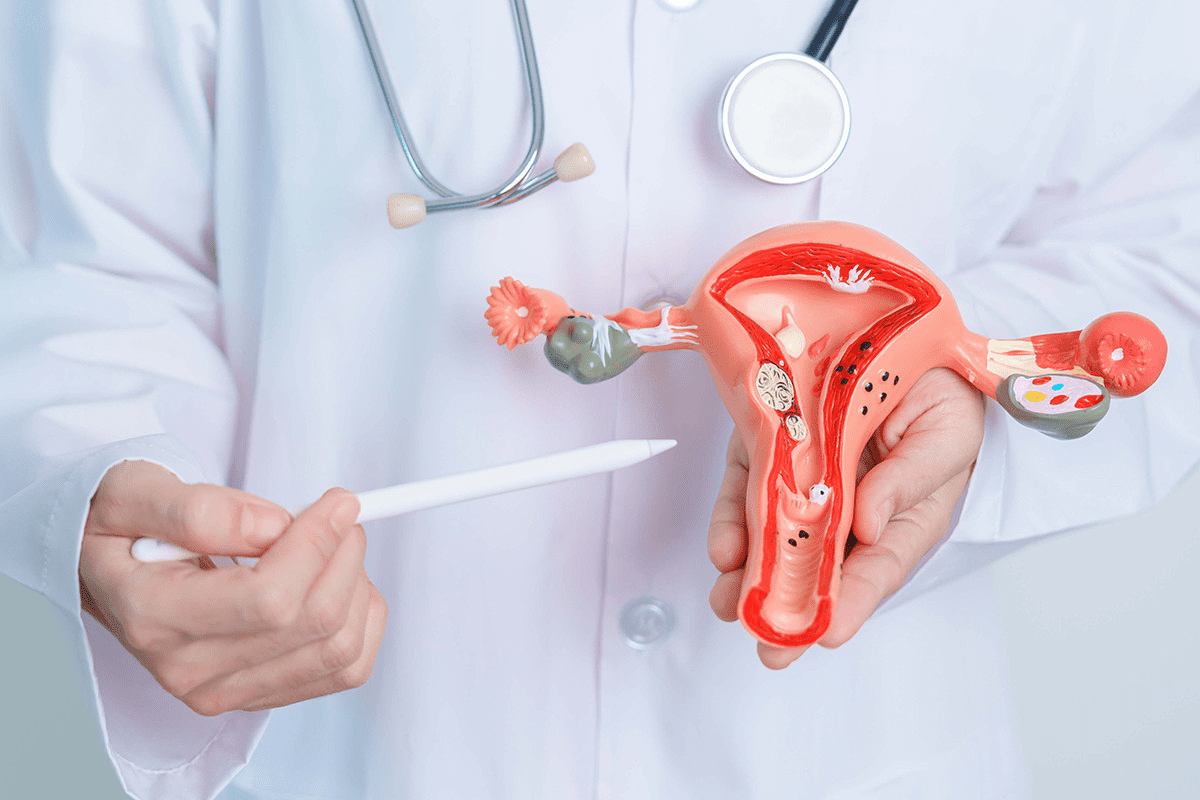Last Updated on November 27, 2025 by Bilal Hasdemir

At Liv Hospital, we know that getting a CT scan can be scary. It’s even more so when you have to take barium sulfate. This substance helps doctors see better on the scan, which is key for diagnosing and treating many health issues. However, it is important to be aware of the side effects of barium sulfate for CT scan, which may include mild stomach cramps, nausea, vomiting, diarrhea, and constipation. Rare but serious side effects like allergic reactions, difficulty breathing, or swelling require immediate medical attention.
Even though barium sulfate is mostly safe, it can cause some side effects. Studies show that about 30% of people might feel a bit off after taking it. Symptoms can range from stomach pain and diarrhea to feeling sick, constipation, or throwing up.
It’s important to know about these possible side effects to stay safe and comfortable. Our team is here to help and support you every step of the way during your CT scan.
Key Takeaways
- Barium sulfate is used as a contrast agent to enhance CT scan image quality.
- Up to 30% of patients may experience mild side effects from barium sulfate.
- Common side effects include stomach cramps, diarrhea, and nausea.
- Patient safety and comfort are our top priorities during CT scans.
- Our experienced care team provides complete support throughout the process.
What is Barium Sulfate and Why is it Used in CT Scans?

Barium sulfate is a key contrast agent in CT scans. It makes internal structures more visible. This helps doctors diagnose many medical conditions by showing the body’s organs clearly on CT scan images.
The Role of Contrast Agents in Medical Imaging
Contrast agents like barium sulfate are very important in medical imaging. They absorb X-rays, helping to show different body tissues and structures. This is key for accurate diagnoses, as it lets doctors spot problems that might not be seen without them.
“The use of contrast agents has changed medical imaging a lot,” say doctors. They are now a key tool in diagnosing diseases.
How Barium Sulfate Enhances CT Scan Results
Barium sulfate makes the digestive tract visible on CT scans. This is great for finding problems in the gut. It helps doctors see things like ulcers, tumors, and other issues.
Using barium sulfate in CT scans gives doctors clearer, more accurate images. This leads to better care for patients. The detailed images are vital for creating effective treatment plans.
Different Methods of Barium Sulfate Administration

Barium sulfate is used in CT scans to improve image quality. It’s given in different ways, depending on the body part and the test’s needs.
Oral Barium Contrast (Barium Drink)
Drinking a barium sulfate mix is one way to get it. This is called a barium drink. It’s used for the upper GI tract scans. The drink covers the digestive tract, showing the stomach, small intestine, and sometimes the esophagus clearly.
Rectal Barium Administration
For the lower GI tract, like the colon, barium sulfate is given through the rectum. A special tube is used. This method gives detailed views of the colon’s inside.
Differences in Patient Experience
How barium sulfate is given affects the patient’s experience. Drinking it might upset some stomachs. But getting it through the rectum can be more uncomfortable for others. Knowing this helps doctors care for their patients better.
| Administration Method | Area Scanned | Patient Experience |
| Oral (Barium Drink) | Upper GI Tract | May cause nausea or discomfort |
| Rectal | Lower GI Tract (Colon) | Can be invasive and uncomfortable |
Side Effects of Barium Sulfate for CT Scan: Statistical Overview
We look at the side effects of barium sulfate in CT scans to understand patient experiences. Barium sulfate makes CT scan images clearer. But it comes with some risks.
Prevalence Rates Among Patients
Research shows that up to 30% of patients may have side effects after a CT scan with barium sulfate. This high rate highlights the need to know the risks and how to avoid them.
Factors That Increase Risk of Side Effects
Some factors can make side effects more likely. These include health issues and how the barium sulfate is given. Knowing these can help doctors reduce side effects.
Typical Timeline for Side Effect Resolution
Most side effects from barium sulfate go away in a few days. Knowing this can ease patient worries and ensure quick help if needed.
Looking at barium sulfate side effects helps us inform patients and doctors about its use in CT scans. This way, we can discuss both the benefits and risks.
Side Effect #1: Diarrhea After Barium Sulfate
Barium sulfate used in CT scans can cause stomach issues, like diarrhea. This side effect is common and can make daily life hard. We’ll look into why it happens, how it’s affected by how barium sulfate is given, and ways to handle it.
Does Barium Sulfate Cause Diarrhea? Understanding the Mechanism
Diarrhea from barium sulfate is due to its effect on the stomach and intestines. It can make the gut move more and change how it works. This can irritate the lining of the bowel and upset the balance of gut bacteria, leading to loose stools.
Differences Between Oral and Rectal Administration
How barium sulfate is given affects the chance of getting diarrhea. Taking it by mouth can irritate the stomach and intestines, leading to diarrhea. But, giving it rectally might lower the risk because it skips the upper gut. Yet, everyone reacts differently, and some may get stomach issues.
Managing and Treating Post-Barium Diarrhea
To deal with diarrhea after a CT scan, drink lots of water or electrolyte drinks. This helps keep fluids and salts balanced. You might also need to take it easy on your diet and eat light foods. If diarrhea doesn’t go away or gets worse, talk to your doctor.
Side Effect #2: Stomach Cramps and Abdominal Pain
Barium sulfate in CT scans can cause stomach cramps and pain. This discomfort is mainly because of the barium sulfate’s nature as a contrast agent.
Why Barium Causes Digestive Discomfort
Barium sulfate can irritate the stomach and intestines. It’s not absorbed by the body. This can make the intestines contract, leading to cramps.
Distinguishing Normal Discomfort from Complications
Some discomfort is normal, but severe pain might be a sign of a problem. We’ve outlined the differences in the table below:
| Symptom | Normal Discomfort | Potential Complication |
| Intensity of Pain | Mild to Moderate | Severe |
| Duration | Temporary, resolves within hours | Prolonged, persists for days |
| Associated Symptoms | None or mild bloating | Vomiting, fever, or severe bloating |
Effective Relief Methods for Barium-Induced Cramping
To ease stomach cramps and pain, try over-the-counter pain relievers. Stay hydrated and use a heating pad on your abdomen. Sometimes, doctors may suggest certain medications to help with these symptoms.
Side Effect #3: Nausea and Vomiting Following Barium CT Contrast
Barium sulfate used in CT scans can cause nausea and vomiting in some people. This is a big worry for those who easily get sick or have a history of motion sickness.
Risk Factors for Increased Nausea
There are several reasons why some people might feel nauseous after a barium CT scan. These include:
- A history of nausea or vomiting with previous medical procedures
- Anxiety or stress related to the procedure
- Motion sickness susceptibility
- Gastrointestinal issues such as gastroparesis or irritable bowel syndrome
Preventive Measures Before the Procedure
To lower the chance of feeling sick, patients can do a few things before the scan:
- Avoid heavy meals or fatty foods before the procedure
- Stay hydrated by drinking clear fluids
- Discuss anti-nausea medication options with your healthcare provider
- Practice relaxation techniques such as deep breathing or meditation
Treatment Options for Post-Procedure Nausea
If nausea or vomiting happens after a barium CT scan, there are ways to help:
- Anti-nausea medications prescribed by a healthcare provider
- Hydration therapy to replace lost fluids
- Dietary adjustments, such as consuming bland foods and avoiding heavy meals
By knowing the risks and taking steps to prevent itthempatients can lessen the chance of feeling sick after a barium CT scan. If symptoms don’t go away, it’s important to talk to a healthcare provider for help and advice.
Side Effect #4: Constipation After Barium CT Scans
Barium sulfate used in CT scans can cause constipation in some people. This is when you have trouble going to the bathroom or don’t go often enough. We’ll look at how barium affects bowel movements, who’s more likely to get constipation, and ways to treat it.
Barium’s Impact on Bowel Motility
Barium sulfate can make bowel movements slower, leading to constipation. It does this by making stool harder to pass. This happens because barium coats the intestines, which can slow down their normal functions.
Patient Groups at Higher Risk
Some people are more likely to get constipation after a barium CT scan. These include older adults, those with existing gut problems, and anyone who has had constipation before.
| Risk Factor | Description |
| Age | Elderly patients are more prone to constipation. |
| Pre-existing Conditions | Patients with gastrointestinal conditions are at higher risk. |
| History of Constipation | Individuals with a previous history are more likely to experience constipation. |
Managing Barium-Induced Constipation
To help with constipation, you can try a few things. Drinking more water can make stool softer. Eating foods high in fiber can also help. Taking laxatives can encourage bowel movements.
Side Effect #5: Bloating and Gas
Barium sulfate, used in CT scans, can cause bloating and gas. This happens because of how barium affects the digestive system.
Physiological Causes of Gas Formation
When you take barium sulfate, it can make gas in your gut. This is because barium changes the gut’s bacteria and slows down digestion. This lets gas-producing bacteria work more.
Expected Duration of Symptoms
Bloating and gas usually go away in a few days after the scan. But how long it takes can vary. It depends on how much barium was used and your digestive health.
Home Remedies and Medical Solutions
There are ways to feel better from bloating and gas. You can try over-the-counter gas relief, eat differently, and drink lots of water. Sometimes, doctors will suggest treatments based on how bad your symptoms are.
| Remedy | Description | Benefits |
| Over-the-counter gas relief medication | Medications like simethicone help alleviate gas bubbles in the stomach and intestines. | Quick relief from bloating and discomfort |
| Dietary adjustments | Avoiding foods that produce gas, such as beans and cabbage. | Reduces gas production and eases digestion |
| Hydration | Drinking plenty of water helps flush out the barium sulfate. | Helps in removing barium from the system, reducing side effects |
Side Effect #6: Allergic Reactions to Barium Sulfate
Patients getting barium sulfate contrast might have allergic reactions. These can be mild or severe. Though rare, these reactions are a big worry for those getting CT scans.
Identifying Mild to Severe Allergic Responses
Allergic reactions show up in different ways. This includes:
- Mild symptoms such as hives or itchy skin
- Moderate symptoms like swelling or stomach discomfort
- Severe reactions, including anaphylaxis, which is life-threatening
Spotting allergic reaction signs early is key to managing them well.
Predisposing Factors for Barium Sensitivity
Some things can make you more likely to have an allergic reaction to barium sulfate. These include:
- A history of allergies or asthma
- Previous reactions to contrast agents
Telling your healthcare provider about any allergies before a CT scan is very important.
Emergency Protocols for Severe Reactions
For severe allergic reactions, quick medical help is needed. Emergency steps include:
- Administering epinephrine
- Providing oxygen and other supportive care
Quick action and treatment of severe allergic reactions are vital to avoid serious problems.
Side Effect #7: Changes in Stool Appearance
Barium sulfate can temporarily change stool color and consistency change temporarily. This is a common side effect. It happens because the body doesn’t absorb barium sulfate, which can alter stool formation and appearance.
Expected Color and Consistency Changes
After a barium sulfate CT scan, stool might look lighter or appear white or clay-colored. It could also be more solid or fragmented. These changes usually go away on their own.
Normal Duration of Stool Alterations
Stool changes from barium sulfate usually last a few days. Most people see their bowel movements return to normal in 2 to 3 days. But this can vary based on individual factors like bowel habits and health.
When Abnormal Stool Changes Warrant Medical Attention
If stool changes last more than a few days or come with severe abdominal pain, fever, or bleeding, see a doctor. A healthcare provider can check if these symptoms are from the barium sulfate or something else.
| Symptom | Normal Duration | When to Seek Medical Attention |
| Light-colored or white stool | 2-3 days | Ifthe pit persists beyond 3 days or is accompanied by other symptoms |
| Changes in stool consistency | 2-3 days | If it persists or is accompanied by severe abdominal pain or bleeding |
Preparation and Aftercare to Minimize Barium Sulfate Side Effects
To lessen side effects from barium sulfate CT scans, preparation and aftercare are key. Doing these right can make the experience better for patients.
Pre-Procedure Dietary Guidelines
Before a CT scan with barium sulfate, follow certain diet tips. Eat a light meal the night before and skip heavy meals or foods that might mess with the scan. Drinking lots of water is important, but your doctor will tell you how much.
Post-Procedure Hydration and Nutrition
After the scan, drinking water is vital to get rid of barium sulfate. Go back to eating normally unless your doctor says not to. Also, eating more fiber can help get rid of barium sulfate.
Medication Considerations
Tell your doctor about any medicines you’re taking. Some might need to change before or after the scan to avoid problems.
By sticking to these tips, you can lower the chance of side effects from barium sulfate CT scans. Doctors say, “Good preparation and care are vital for a safe and good test.”
When to Seek Medical Attention for Barium CT Scan Complications
After a barium CT scan, knowing when to seek medical help is key. Some complications are rare but serious. They need quick medical care.
Red Flag Symptoms Requiring Immediate Care
Some symptoms after a barium CT scan mean you need to see a doctor right away. These include:
- Severe abdominal pain
- Difficulty breathing
- Severe allergic reactions (e.g., hives, swelling)
- Vomiting blood or experiencing severe nausea
Delayed Reactions to Monitor
Some reactions may take time to show up. Watch for signs like:
- Persistent constipation
- Severe diarrhea
- Changes in stool lasting more than a few days
If you notice any of these, call your healthcare provider.
Communicating Effectively With Healthcare Providers
Talk clearly with your healthcare provider about any issues after a barium CT scan. Share your symptoms, when they started, and how bad they are. This helps your provider help you better.
Staying informed and active about your health after a barium CT scan is important. If you’re unsure or worried, contact your healthcare provider.
Conclusion: Balancing the Benefits and Side Effects of Barium CT Scans
We’ve looked into barium sulfate in CT scans, its good points and possible downsides. Barium CT scans are key to finding out what’s wrong and how to fix it. They help doctors make the right treatment plans.
It’s important to know about side effects like diarrhea, stomach pain, and allergies. This helps patients get ready for their scan. Doctors can then use CT scans to help patients more, while keeping risks low.
Getting ready for a scan is important. Patients should eat right before, drink water after, and watch for signs of trouble. This way, the scan’s benefits are seen, and risks are lessened.
In the end, the good of barium CT scans is more than the bad. They are a vital part of today’s medicine. Being informed and ready, patients can get the best results from their scans.
FAQ
What is barium sulfate, and why is it used in CT scans?
Barium sulfate is a contrast agent used in CT scans. It coats the inside of the digestive tract. This makes internal structures more visible during the scan.
Does barium sulfate cause diarrhea?
Yes, barium sulfate can cause diarrhea. The risk depends on how it’s given. Rectal administration is more likely to cause diarrhea than oral administration.
What are the common side effects of barium sulfate for CT scans?
Side effects include diarrhea, stomach cramps, and nausea. You might also experience vomiting, constipation, bloating, and gas. Stool appearance can change, too. Rarely, allergic reactions can happen.
How can I manage diarrhea after a barium CT scan?
To manage diarrhea, drink lots of fluids. You can also take anti-diarrheal medication as advised by your doctor. Avoid spicy or fatty foods.
Why do I experience stomach cramps and abdominal pain after barium sulfate?
Stomach cramps and pain can happen because of the barium sulfate. It coats the digestive tract,irritatingn. This is usually temporary and can be eased with over-the-counter pain relief.
Can barium sulfate cause constipation?
Yes, barium sulfate can cause constipation. It affects bowel motility, which is more likely in those at risk for constipation.
How can I alleviate bloating and gas after a barium CT scan?
To ease bloating and gas, try over-the-counter gas relief. Avoid carbonated drinks and do light physical activity. Symptoms are usually short-lived.
What are the signs of an allergic reaction to barium sulfate?
Allergic reactions can range from mild to severe. Mild symptoms include hives or itching. Severe symptoms are difficulty breathing or a rapid heartbeat. Seek immediate medical help if you experience severe symptoms.
How long do changes in stool appearance last after barium sulfate?
Changes in stool appearance, like white or light-colored stools, are usually temporary. They resolve within a few days. If they last longer or are concerning, talk to your doctor.
What can I do to minimize the risk of side effects from barium sulfate?
To reduce side effects, follow dietary guidelines before the procedure. Stay hydrated afterward. Discuss any medication concerns with your healthcare provider.
When should I seek medical attention after a barium CT scan?
Seek immediate medical help for severe symptoms like difficulty breathing or severe abdominal pain. Also, watch for delayed reactions. Talk openly with your healthcare provider about any concerns.
References
- National Health Service (NHS). (2021). Preparing for your CT scan. https://www.nhs.uk/conditions/ct-scan/preparation/






